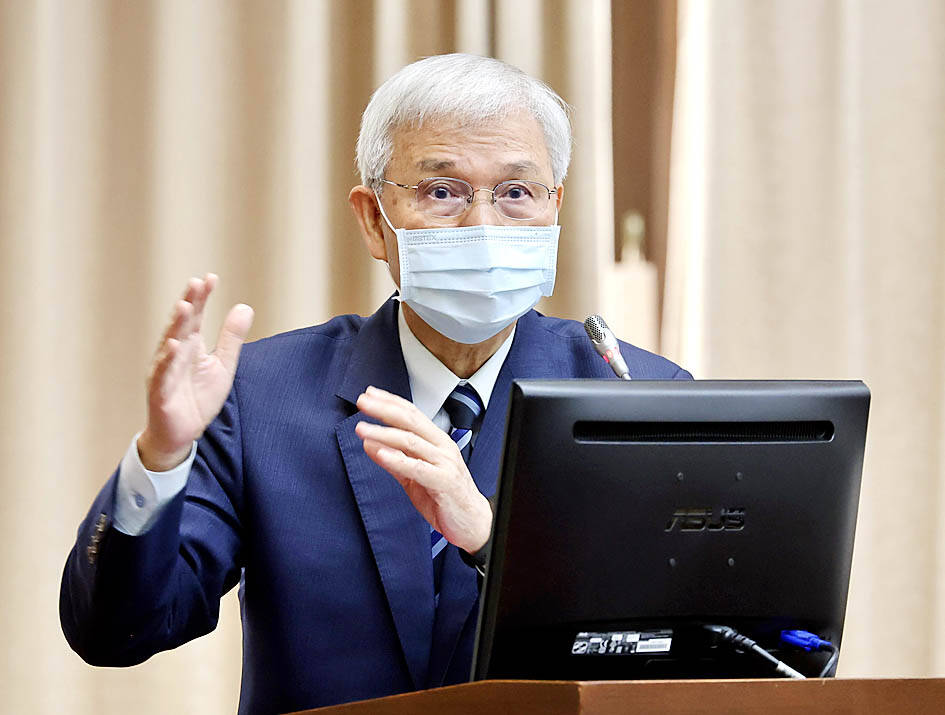Core consumer prices would top the list of concerns when the central bank revisits its monetary policy next month, as headline inflation has held steady while core readings continue to rise, Governor Yang Chin-long (楊金龍) said yesterday.
Yang shared his views on inflation and other economic issues while taking questions from lawmakers during a legislative hearing in Taipei, ahead of the central bank’s next board meeting on June 15.
Yang said his biggest concern is the core consumer price index (CPI), which advanced 2.72 percent last month, although headline inflation stayed unchanged at 2.35 percent.

Photo: CNA
Higher core CPI readings suggest sticky inflationary pressures ahead, Yang said, as the measure excludes volatile items such as fuel and vegetable prices.
If core CPI climbs higher, the central bank could raise interest rates again to tame inflation, although it would also take the nation’s economic health into consideration, he said.
Taiwan’s export-oriented economy contracted 3.02 percent during the January-to-March period and is expected to remain soft this and next quarter, as global inflation and monetary tightening slows demand for electronic components, the nation’s main export driver.
Taiwan has felt the pinch of economic uncertainty induced by aggressive interest rate hikes in the US and Europe, Yang said, adding that a recovery would take place in the fourth quarter, if not next quarter.
“Much depends on when inventory adjustments will end,” Yang said.
National Development Council Minister Kung Ming-hsin (龔明鑫) on Tuesday said that exports continue to disappoint, in line with conservative guidance from major tech firms that inventory corrections would persist into next quarter.
The Directorate-General of Budget Accounting and Statistics is on Friday expected to trim its forecast for Taiwan’s GDP growth this year, after exports and private investment fared weaker than expected.
Yang attributed Taiwan’s inflationary pressures to conspicuous rises in food, entertainment and travel charges in the wake of the government’s removal of border controls and other COVID-19 restrictions.
Dining costs, once risen, have little chance of falling before the year-on-year comparison effect fades, Yang said, responding to comments the central bank has failed to rein in inflation.
Taiwan’s inflation is moderate when compared with other countries, he said.
Yang said the US Federal Reserve is widely expected to end its rate hike cycle next month after inflation in the US fell below 5 percent and is expected to drop to the Fed’s 2 percent target by 2025.
The chance of further rate hikes is small against that backdrop, he said.

Vincent Wei led fellow Singaporean farmers around an empty Malaysian plot, laying out plans for a greenhouse and rows of leafy vegetables. What he pitched was not just space for crops, but a lifeline for growers struggling to make ends meet in a city-state with high prices and little vacant land. The future agriculture hub is part of a joint special economic zone launched last year by the two neighbors, expected to cost US$123 million and produce 10,000 tonnes of fresh produce annually. It is attracting Singaporean farmers with promises of cheaper land, labor and energy just over the border.

US actor Matthew McConaughey has filed recordings of his image and voice with US patent authorities to protect them from unauthorized usage by artificial intelligence (AI) platforms, a representative said earlier this week. Several video clips and audio recordings were registered by the commercial arm of the Just Keep Livin’ Foundation, a non-profit created by the Oscar-winning actor and his wife, Camila, according to the US Patent and Trademark Office database. Many artists are increasingly concerned about the uncontrolled use of their image via generative AI since the rollout of ChatGPT and other AI-powered tools. Several US states have adopted

A proposed billionaires’ tax in California has ignited a political uproar in Silicon Valley, with tech titans threatening to leave the state while California Governor Gavin Newsom of the Democratic Party maneuvers to defeat a levy that he fears would lead to an exodus of wealth. A technology mecca, California has more billionaires than any other US state — a few hundred, by some estimates. About half its personal income tax revenue, a financial backbone in the nearly US$350 billion budget, comes from the top 1 percent of earners. A large healthcare union is attempting to place a proposal before

KEEPING UP: The acquisition of a cleanroom in Taiwan would enable Micron to increase production in a market where demand continues to outpace supply, a Micron official said Micron Technology Inc has signed a letter of intent to buy a fabrication site in Taiwan from Powerchip Semiconductor Manufacturing Corp (力積電) for US$1.8 billion to expand its production of memory chips. Micron would take control of the P5 site in Miaoli County’s Tongluo Township (銅鑼) and plans to ramp up DRAM production in phases after the transaction closes in the second quarter, the company said in a statement on Saturday. The acquisition includes an existing 12 inch fab cleanroom of 27,871m2 and would further position Micron to address growing global demand for memory solutions, the company said. Micron expects the transaction to